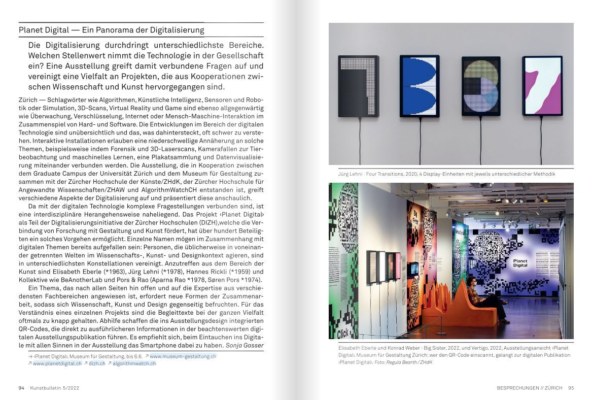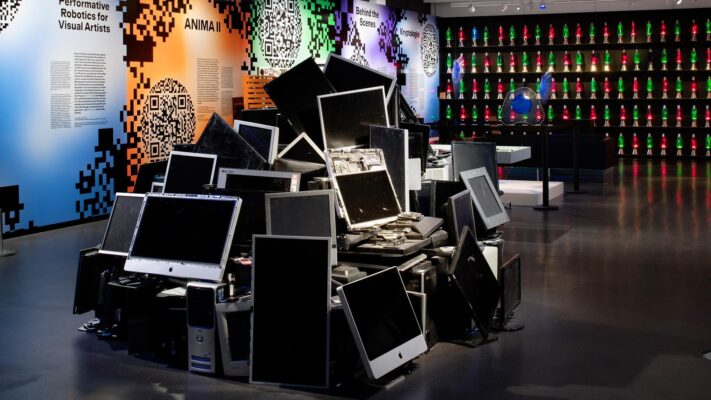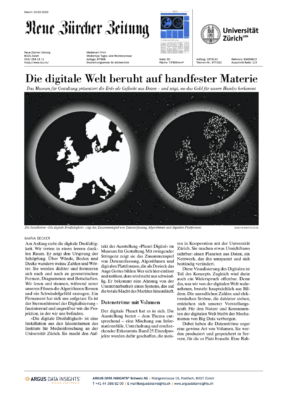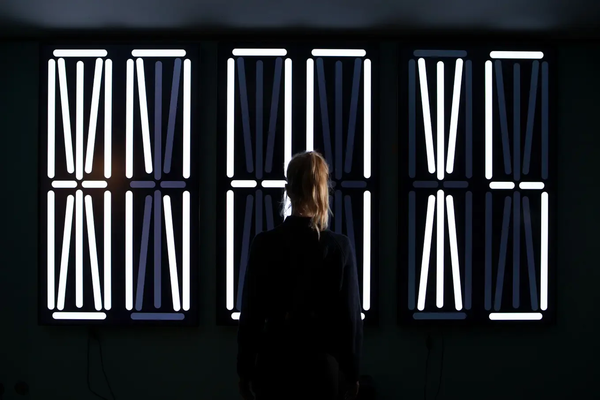Robot blessings
Five years ago, BlessU-2 made its debut at the World Reformation Exhibition in Wittenberg. Since then, the controversial blessing robot has been around a lot. For one more week, it will be giving its blessing at Museum für Gestaltung Zürich as part of the "Planet Digital" exhibition, which is well worth seeing.
Human rights for robots
Machines are becoming more and more human. So it seems obvious to fundamentally rethink the way we deal with them.

This year's UZH Alumni General Assembly took place at Museum für Gestaltung Zürich with around 120 participants. After a tour of the "Planet Digital" exhibition, which was accompanied by students and researchers from the University of Zurich, President Alex Rübel reflected on his first year in office.

Digitization is changing the world. If the big tech companies have their way, we'll be living in a digital parallel world in the future: the metaverse. What does that mean for us? "Twist" visits the "Planet Digital" exhibition in Zurich, meets the makers of a virtual museum in Berlin and designers in Amsterdam who create digital fashion.
Aesthetic Balance
Neuro-Ophtalmologist Konrad Weber develops diagnostic tests to measure patients' balance disturbances. The data obtained show a sense of beauty, as an installation in the exhibition "Planet Digital" proves.
Diving into the digital world
In the impressive exhibition "Planet Digital", the University of Zurich and the Museum of Design meet creative minds from the worlds of art and science, who together make digitization a tangible experience for everyone.

Mihailo Stojanovic ucestvovao u projektu Planet digital u Svajcarskoj
Planet Digital in Serbian TV.

A panorama of digitalization
Digitization is permeating a wide variety of areas. What status does the technology have in society? An exhibition takes up related questions and brings together a variety of projects that have emerged from collaborations between science and art.
Experiencing and understanding the digital transformation
The exhibition "Planet Digital" by University of Zurich and Museum für Gestaltung Zürich attempts to show the background of digitalization. In the process, things that otherwise remain hidden become visible.
More than just zeros and ones
Digitization is everywhere and nowhere. It's not in the coffee that's on the table in front of me, but it controls the machine that makes it. It ensures that I can buy the ticket for the next streetcar. Digitization consists of code, infinitely long series of command lines that become algorithms, artificial intelligence that controls robots, access controls and decisions. So how can we make digitization tangible? Answers have been gathered by Katharina Weikl of the University of Zurich and Damian Fopp of the Museum für Gestaltung Zürich. The result is called 'Planet Digital'.
Digital, please!
Various technological creations adorn the landscape of "Planet Digital"; information texts are available for all of them via QR code. Some pieces captivate the eye with their beauty: there is a robot that draws ballet notation on a blackboard with chalk. Next to it, there are water creatures that float in the air and flutter shyly when I approach them - controlled by motion sensors. And lava lamps glow in front of a black wall, the shape of which triggers an encryption process. Other technologies shine through their usefulness: for example, camera traps that use machine learning to shoot images of rare animals. A 3D printer that replicates skulls is also impressive - criminologists can use it to test the impact of crime weapons. Useless, but of symbolic value, is the handshake of two robotic hands standing in the atrium of the University of Zurich: They are controlled from the exhibition.

"The possibilities of digitalization are increasing competition in the religious marketplace."
Thomas Schlag researches the question of how new technologies are changing religions. There are no signs that society is secularizing, says the theologian in an interview with Dorothee Vögeli, but religious practice is individualizing and globalizing.

Digitization is driving progress and permeating all areas of our lives. What it is doing to us and our planet is currently being shown in the "Planet Digital" exhibition at Museum für Gestaltung Zürich.

Gender bias and (un)fair algorithms: "Fairness depends on our values."
The question of the fairness of an algorithm for awarding social welfare, for example, is not a mathematical question, but a question about the values that should be anchored in our social welfare system. In our project we try to stimulate this social discourse, for example through our collaboration with AlgorithmWatch Switzerland and Museum für Gestaltung Zürich on the exhibition "Planet Digital".
The digitization of our world is marching on. There is hardly an area of our lives that is free of computers and the influence of the internet. But still, few understand what is actually happening around us. The excellently designed exhibition "Planet Digital" provides insights into the wondrous digital world that surrounds us.

Le Musée du design de Zurich dévoile comment la numérisation nous gagne
Découvrir ce qui se cache derrière la surface brillante de la digitalisation, voilà ce que propose le Musée du design de Zurich, en collaboration avec l'Université de Zurich. Une nouvelle exposition intitulée "Planet Digital", à mi-chemin entre la science et l'art, à voir jusqu'au 6 juin 2022.

Digitization hands-on
You always wanted to know how the internet actually works? Witness how gold travels from a mine in the Congo all the way to your smartphone? Or observe animals from all around the world in a video pavilion? The exhibition "Planet Digital" by University of Zurich and Museum für Gestaltung Zürich makes it possible.

PATHOS at the exhibition Planet Digital
Our outreach project PATHOS is participating in the current exhibition Planet Digital at the Museum für Gestaltung in Zurich. The exhibition is about the state of digitization and puts our digital present and future under the microscope. Organized by the University of Zurich and the Museum für Gestaltung Zürich in collaboration with the Zurich University of the Arts and the Zurich University of Applied Sciences, featuring their most creative minds.

From gigantic server landscapes to social questions: in the exhibition "Planet Digital", innovative researchers meet art and design creatives. Together, they turn the science around digitization into an experience.

With the blessing of the robot
In the Museum für Gestaltung, the exhibition "Planet Digital" is on show until June. With plenty of opportunity for interaction, fascinating object history and comprehensible knowledge transfer in complex topics, the exhibition shows a refreshing approach to the debate on digital transformation.
Computational linguistics will meet up here with interaction design, psychology will contend with virtual reality art, and political science will engage with visual communication.
The invisible world of algorithms
Around 25 exhibits make the invisible world of algorithms, into which we are entangled like into transparent packing cotton, a bit more tangible. Rather than deliver a warning, curators Katharina Weikl, Graduate Campus of the Unviersity of Zurich, and Damian Fopp, Museum für Gestaltung, aimed to provide food for thought.

The digital world relies on tangible matter
University of Zurich and Museum für Gestaltung present the world as a web of data - and show where the gold for our smartphones come from.
Hessen-Nassau's robot learns Swiss German
For a guest appearance in Switzerland, the blessing robot of the Protestant Church in Hesse and Nassau (EKHN) has now learned Swiss German. The installation called "BlessU2" comes to the Museum of Design in Zurich until June, as the EKHN announced on Thursday in Darmstadt. There, the robot will become part of the large-scale exhibition "Planet Digital", which in cooperation with the University of Zurich asks 25 installations about the consequences of digitalization.
“Digitization” originally referred only to the conversion of analogue information into digital data. But today the broader phenomenon known as “digitalization” is fundamentally changing our world.

Experiencing the beauty of research
The world is digital. It is digitized to a point where we forget how much life on our planet has changed due to new technologies. The exhibition "Planet Digital", result of a a cooperation of University of Zurich and Museum für Gestaltung, can change that.
Planet Digital is a collaboration between University of Zurich and Museum für Gestaltung Zürich together with Zurich University of the Arts and Zurich University of Applied Sciences, as well as the non-profit organization AlgorithmWatch.
Digital research and design join forces
In general, digitalization offers many new opportunities for art. The works Big Sister and Vertigo, for instance, use eye movement tracking technologies otherwise deployed in medicine to create interactive works, and a historian makes flow charts using a drawing machine devised by Jürg Lehni.
Artificial art
While nature is becoming more and more part of the digital space, machines are conversely growing more nature-like. The Indian-Danish artist duo Pors & Rao developed PATHOS, a toolbox that makes robots appear to be animate objects. In the installation ANIMA II, floating and pulsating “underwater creatures” made from inanimate material react dynamically to viewers. The project was inspired by an exchange of ideas between the two artists and a biologist from the University of Zurich.
From the courtroom to the prayer room
Those who like to get actively involved can try their hand at solving a murder case in Planet Digital. Film students from ZHdK shot a crime thriller that incorporates the latest in computer forensics. Many other phenomena brought about by the digital transformation are awaiting discovery in the exhibition, from deep fakes to computer games and virtual reality installations, and from research satellites to electronic waste.
In Zurich, University and Museum of Design are dedicated to the digital transformation
In order to survey the “digital planet” and show what is behind the keyword “digital change”, the show refers to 23 current research projects and takes a close look at rare earths, gigantic server landscapes, technical gadgets and social issues.
Between February to June, University of Zurich and Museum für Gestaltung Zürich invite the public to the Planet Digital exhibition. Based on current research projects, it offers a panoramic flight around the world of digitization.
Expedition «Planet Digital»
The exhibition "Planet Digital" in the Museum für Gestaltung Zürich invites you to a expedition into the universe of digitalization. The museum and the University of Zurich came together to present projects at the borderline between research and design. The expedition includes an "out-of-body experience" and guides you through a community garden all the way to the Congo.
What digitization is and includes, and how it is changing the world, is a highly complex question. In order to make this change visible, several universities have joined forces for the "Planet Digital" project and are now using it to occupy the Museum für Gestaltung, the internet and, of course, public space.
Can algorithms be fair? Will artificial intelligence make us all redundant? Is there a media truth? And what do lava lamps have to do with data protection?
From rare earths to gigantic server landscapes and technical gadgets to social issues: Planet Digital takes a close look at our digital present and future.